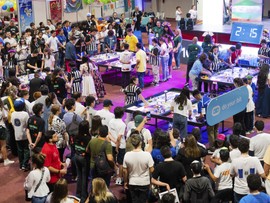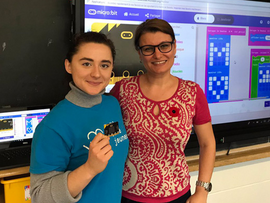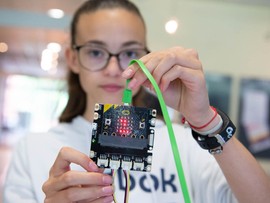Compton Unified School District
By collaborating with a local initiative in the US, we were able to help amplify the impact that Compton Unified School District could have in their district and beyond.
An essential step to having an impact on children around the world is to deliver change on a very local level. The organisations that work closely within their areas have unique insights into the opportunities and needs of their community. Their connections are essential to the success of many projects.
While there are many places where there are low incomes and challenges to learning, there are many organisations doing incredible things to support students in their areas. Compton Unified School District is an example of an organisation that is dedicated to bringing world-class science and technology education directly to students that would not normally be exposed to those experiences.
Building ambitious futures from uncertain beginnings
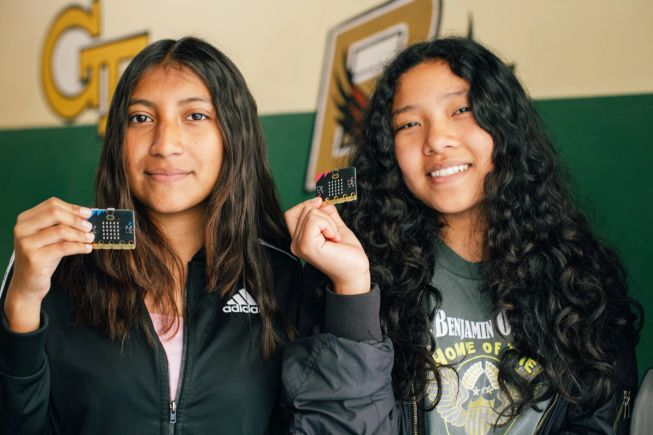
Compton Unified School District (CUSD), in Los Angeles, USA, serves nearly 26,000 students across 36 sites, including 27 elementary and middle schools. Many of the students come from low income backgrounds and are English language learners. With the support of their teachers and community, they are ambitious about their futures.
They wanted to build opportunities and exposure for Compton students with physical computing and coding, in order to foster digital creativity and make solutions with tech and computing. In order to achieve this, teachers also need to have the confidence and capability to deliver physical computer and coding activities and lessons in their schools.
In doing so, computing science can start to be seen as a solution for creating change in the world, and a career pathway for more students, who might not otherwise have seen themselves represented in the sector.

If you look at the demographics of the students here in Compton, those are the types of students that are underrepresented in computer science. So to be able to provide access for them, to a tool like the micro:bit, to computer science in general, to coding, all these things really gives them the opportunity to see this as a possible pathway for themselves.

Darren Alcala, micro:bit Champion
Collaboration on a local and international scale
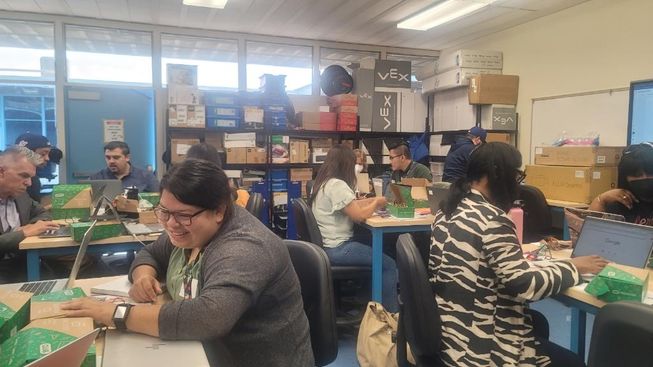
Micro:bit Educational Foundation could see how CUSD’s work aligned with our mission, and so secured £20k of funding and 500 micro:bits with OKdo. OKdo’s generous support meant that there were enough micro:bits for every STEAM Lab in the district, and opened the door to build capacity by amplifying local expertise.
CUSD brought in 9 Dots, a non-profit serving the Los Angeles community with computer science education experiences, to deliver training and support for educators in the area. Through summer schools, STEAM labs, challenges and celebration events over the year, CUSD built a programme to engage students with the micro:bit and digital experiences over the year.
We also brought in local micro:bit Champions to help provide additional support and expertise as the project went on.

By working together with local partners, local school leaders, we were actually able to best support teachers to make decisions for their students in the classroom.

Katie Henry, Head of North America, Micro:bit Educational Foundation
Influencing their neighbours
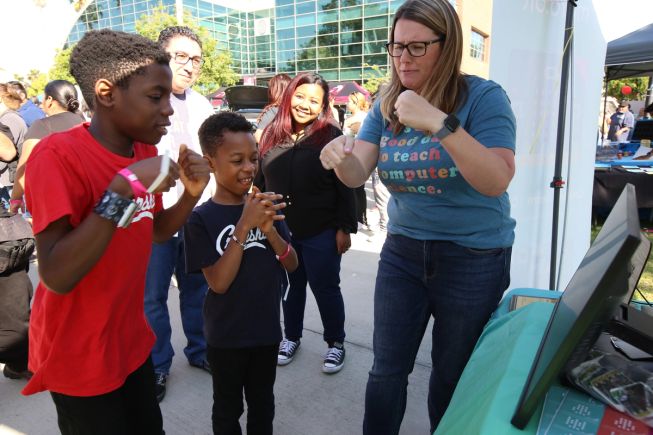
CUSD planned to deliver a summer STEAM camp for students, training for teachers, and organising opportunities for students to showcase projects at two big events in the school calendar - the Computer Science Showcase and STEAMFest.
By planning training and support at the start of the school year, teachers could then deliver their teaching and support students to produce projects for the showcase events. This structured approach gave teachers the impetus to teach with micro:bits right away, and get students motivated to participate in projects.
The training used many principles from our do your :bit resources, building teaching around design thinking principles, to open up a world of creativity and thinking about coding and computing as solutions. This facilitated collaboration and teamwork with the students, and many of them found that aspect of micro:bit lessons the most enjoyable.
The immediate impact was such that LAUSD wanted to be part of it, and training extended to the schools in their area too.

This definitely motivates students. It increases engagement, it increases communication, collaboration, critical thinking, and of course, creativity.

Alvaro Brito, STEAM Administrator, Compton Unified School District

I don’t feel overwhelmed or bothered by the problems anymore, because I know that I can fix them, and one day I can learn more about it.

Amy, student, Davis STEAM Lab
Impact and results
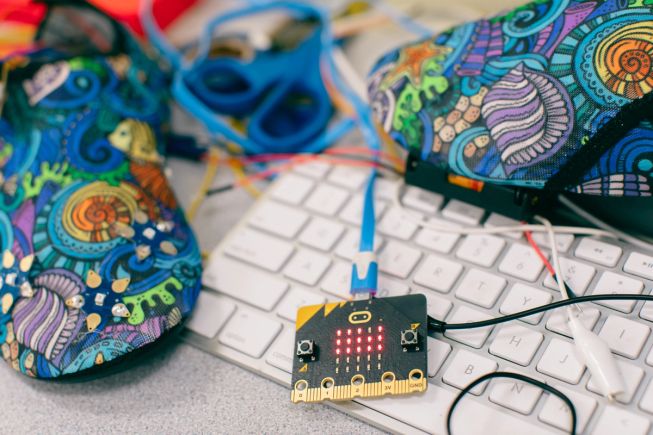
The project exceeded all goals:
- 33 teachers trained in CUSD. Two micro:bit Champions trained CUSD staff, who went on to train 9 Dots staff
- 300 teachers supported across 33 schools in CUSD
- set up/expanded 33 STEAM labs
- had impact across 2 school districts
- over 12.5k children engaged with the programme in 1 year
The impact of the project is clear:
- 90% of teachers said they were confident or very confident to use their learning and the materials provided with their students. (post training survey: 19 teachers)
- 90% of teachers agreed or agreed strongly that using micro:bit resources had increased their confidence in teaching computing (including coding/programming, computational thinking). (post training survey: 19 teachers)
- 95% of teachers agreed that they felt able to help my students understand how computing and coding can be used to reduce inequality in society after training, versus 76% before (post training survey: 19 teachers v pre training survey 17 teachers)
- 50%of young people stated that using micro:bit has made them feel more confident in coding (post survey: 248 YP)
- 61% of young people agreed that they’d like a job linked to coding in the future after learning with micro:bit, versus 47% before the project started (post survey: 248 YP v pre survey: 311 YP)
- 76%of young people agreed that they found coding easy after learning with micro:bit, versus 57% before the project started (post survey: 248 YP v pre survey: 311 YP)
- 80%of girls agreed that coding is a useful skill to learn (post survey: 130 girls)

The micro:bit really expanded my students’ horizons.

Jose Gonzales, Teacher at CUSD
Accelerating the project
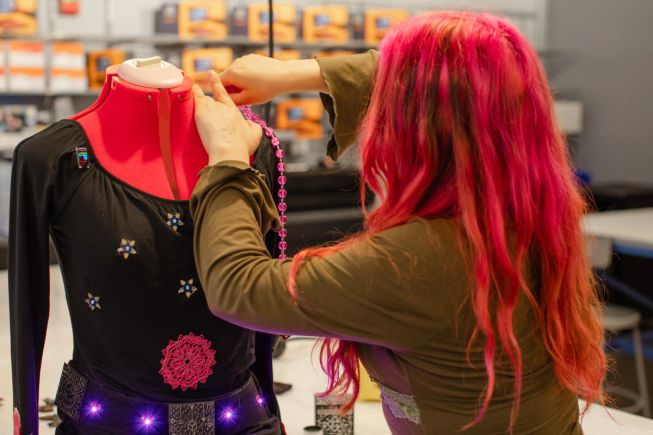
CUSD aim to expand in the second year of their project, writing a new summer school STEAM curriculum and new lessons for the upcoming school year. These will be based on our existing resources, such as the First lessons unit of work and the machine learning tool. Their goal is to advance student skills who learned with the micro:bit in the prior year.
By closely aligning to CUSD’s initiatives, the project invested in strategic training of educational leaders and key partner 9 Dots, while prioritising the materials budget on low-cost and flexible hardware (avoiding consumables). With no additional outside funding, the project is positioned to expand within the district for 2024-2025 school year and beyond.
